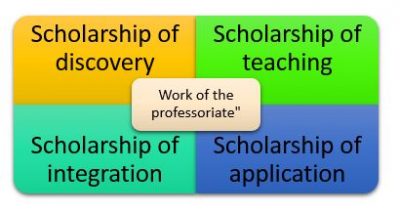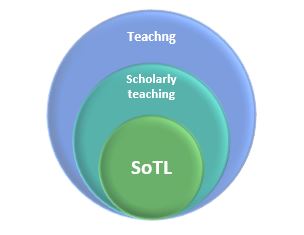What can I do to facilitate student learning?
Does this technique improve student learning?
Are my students learning?
What is technology's impact on learning?
How do I know what students are learning?
By bringing a scholarly focus to teaching and learning in higher education, the scholarship of teaching and learning (SoTL) uses discovery, reflection, and evidence-based methods to answer questions about student learning. At the core of the SoTL philosophy is an understanding that intentionally studying teaching practices and student learning outcomes is crucial for producing excellence in instruction.
SoTL involves:
- asking meaningful questions about student learning and the teaching activities designed to facilitate it;
- answering those questions with evidence of student learning and systematically analyzing this evidence; and
- sharing the results of that analysis publicly to contribute to the body of knowledge on student learning.
Per Huber and Hutchings, SoTL means viewing the work of the classroom as a site for inquiry, asking and answering questions about students' learning in ways that can improve one's own classroom, advance the profession of teaching, and create optimal learning opportunities.
In 1990, in an effort to define the scholarship performed by faculty as more than just “teaching versus research,” Ernest L. Boyer, in his influential book Scholarship Reconsidered: Priorities of the Professoriate (1990), concluded that “the work of the professoriate might be thought of as having four separate, yet overlapping, functions:

Boyer argued that the academy should recognize and reward all four components of scholarship, including the scholarship of teaching.
Have you ever heard the terms “the scholarship and teaching and learning” and “scholarly teaching” and wondered if they were the same? Although similarities exist between the scholarship of teaching (SoTL) and scholarly teaching, they differ in intent and outcome. All faculty should strive for scholarly teaching but not all will engage in the scholarship of teaching and learning. The purpose of scholarly teaching is to impact the activity of teaching and the resulting learning. In contrast, SoTL results in a formal, peer-reviewed dissemination of findings which expand the knowledge base of teaching and learning in higher education.
Scholarly Teaching vs. SoTL

Scholarly teachers consult the literature, select and apply appropriate information to guide the teaching-learning experience, conduct systematic observations, analyze the outcomes, and obtain peer evaluation of their classroom performance (Richlin, 2001). Such teaching tends to focus on effective teaching, rather than on student learning. Evidence for scholarly teaching may include teaching portfolios, course portfolios, course development, course redesign, observation of teaching, and teaching projects. Evaluation of scholarly teaching could include evidence of clear goals, adequate preparation, appropriate choice of methods, effective use of methods, modifications of plans and procedures to meet changing circumstances, demonstration of significant results, effective presentation when teaching, and reflective critique of performance.
SoTL is student learning focused because it goes beyond scholarly teaching and is driven by a desire to understand how students learn effectively and how teaching influences this process. The evidence for SoTL extends beyond teaching excellence or expertise and extends the boundaries of an individual instructor to expansion of the knowledge base of others. The evaluation of SoTL requires in-depth understanding of the literature, critical reflection, and sharing through publication (Allen & Field, 2005, p.1). Evidence of SoTL could include papers, presentations, publications that reflect discipline, pedagogy, and innovations in teaching and analyses of intervention to demonstrate improved learning. SoTL evaluation is based on critical review of public materials (presentations and papers), availability in some media format, emphasis on learning outcomes, and incorporation of discipline and pedagogical knowledge and innovation.
New Directions for Teaching and Learning Special Issue: Doing the Scholarship of Teaching and Learning: Measuring Systematic Changes to Teaching and Improvements in Learning
- Advancing Scholarly Research on Teaching and Learning
- Using Assessment and SoTL to Enhance Student Learning
- Designing SoTL Studies - part 1: Validity
- Designing SoTL Studies - part 2: Practicality
- Statistical Models for Analyzing Learning Data
- Navigating the IRB: The Ethics of SoTL
- Tell a Good Story Well: Writing Tips
- Navigating the Minefields of Publishing
- Faculty Development Centers and the Role of SoTL
Quick Links
![]()
Consult with our CETL Professionals
Consultation services are available to all UConn faculty at all campuses at no charge.